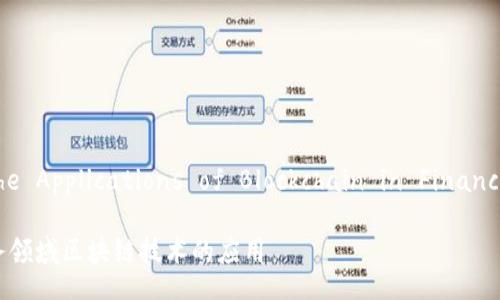Title:Exploring the Applications of Blockchain in Financial
Introduction:
Blockchain technology is revolutionizing the financial sector by enabling secure and transparent transactions between parties without the need for third-party intermediaries. With the rise of digital currencies and decentralized networks, financial institutions have begun exploring the vast potential of blockchain. This article delves into the applications of blockchain in financial services, from decentralized payments to credit scoring and insurance.
 Smart contracts are self-executing contracts with the terms of the agreement between parties directly written into code. These contracts are executed automatically when certain conditions are met, providing a transparent and efficient way of conducting transactions. Smart contracts can be used for a range of financial services, from insurance claims to trade finance and supply chain management.
Smart contracts are self-executing contracts with the terms of the agreement between parties directly written into code. These contracts are executed automatically when certain conditions are met, providing a transparent and efficient way of conducting transactions. Smart contracts can be used for a range of financial services, from insurance claims to trade finance and supply chain management.
 Blockchain technology can provide a more accurate and transparent credit scoring system for individuals and businesses. By creating a decentralized ledger of financial transactions, lenders can access a more complete picture of an applicant's credit history. This can lead to more accurate credit assessments and fairer lending practices.
Blockchain technology can provide a more accurate and transparent credit scoring system for individuals and businesses. By creating a decentralized ledger of financial transactions, lenders can access a more complete picture of an applicant's credit history. This can lead to more accurate credit assessments and fairer lending practices.
1. Decentralized Payments
Blockchain technology provides a secure and transparent way of sending and receiving payments without intermediaries. Decentralized payment systems enable individuals and businesses to transact directly with each other, eliminating the need for banks or payment processors. Using cryptocurrencies such as Bitcoin and Ethereum, users can make quick and low-cost transactions without worrying about cross-border restrictions or transaction fees.2. Smart Contracts
 Smart contracts are self-executing contracts with the terms of the agreement between parties directly written into code. These contracts are executed automatically when certain conditions are met, providing a transparent and efficient way of conducting transactions. Smart contracts can be used for a range of financial services, from insurance claims to trade finance and supply chain management.
Smart contracts are self-executing contracts with the terms of the agreement between parties directly written into code. These contracts are executed automatically when certain conditions are met, providing a transparent and efficient way of conducting transactions. Smart contracts can be used for a range of financial services, from insurance claims to trade finance and supply chain management.
3. Identity Verification and Fraud Prevention
Blockchain technology can help prevent identity fraud by creating a secure and tamper-proof digital identity for individuals. By using a decentralized network, individuals have more control over their personal information, and fraudsters are unable to manipulate or steal personal data. Blockchain can also be used for fraud prevention in areas such as insurance claims, by creating a transparent system of verifying claims and payouts.4. Credit Scoring and Lending
 Blockchain technology can provide a more accurate and transparent credit scoring system for individuals and businesses. By creating a decentralized ledger of financial transactions, lenders can access a more complete picture of an applicant's credit history. This can lead to more accurate credit assessments and fairer lending practices.
Blockchain technology can provide a more accurate and transparent credit scoring system for individuals and businesses. By creating a decentralized ledger of financial transactions, lenders can access a more complete picture of an applicant's credit history. This can lead to more accurate credit assessments and fairer lending practices.
5. Trading and Settlements
Blockchain technology can streamline the process of trading securities and settling financial transactions. By using a distributed ledger, intermediaries such as clearinghouses and exchanges can be bypassed, reducing costs and increasing efficiency. This can lead to faster payments, reduced counterparty risk, and more transparent trading practices.6. Insurance Claims Management
Blockchain technology can simplify and streamline the claims management process for insurance companies. By creating a transparent and auditable system for verifying claims, insurers can reduce fraud, speed up claims processing, and improve customer satisfaction. Smart contracts can be used to automate claims processing, simplifying and accelerating the entire claims management process.7. Asset Tokenization
Blockchain technology can enable the tokenization of assets, such as real estate or commodities. This allows for the fractional ownership of assets, reducing the barriers to investment and increasing liquidity. By putting assets on a blockchain, ownership can be verified, transferred, and traded more efficiently, leading to new investment opportunities and more transparent markets. Conclusion: Blockchain technology is transforming the financial services industry by providing secure and efficient ways of conducting transactions. From decentralized payments and smart contracts to asset tokenization and insurance claims management, blockchain has the potential to reshape the financial landscape. By understanding the applications of blockchain in financial services, businesses and individuals can take advantage of this revolutionary technology and unlock a world of new possibilities.